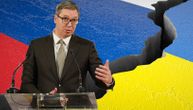Krstic: Point of meeting in Berlin is for Germany to take helm in Belgrade-Pristina dialogue
"Scholz will have more understanding than other EU leaders," Krstic said
Assistant professor at the Faculty of Political Sciences in Belgrade Milan Krstic says that the focus of the talks in Berlin today between Serbian President Aleksandar Vucic and German Chancellor Olaf Scholz will be the dialogue between Belgrade and Pristina and Serbia's stance towards the war in Ukraine.
Krstic believes that the original point of this meeting is that Germany and the German chancellor are thus trying to take the helm in the dialogue.
Milan Krstic said that the two most difficult topics for us at the moment are the dialogue between Belgrade and Pristina, which has been stalled since 2017, and the second is our stance towards the war in Ukraine and whether we will impose sanctions against Russia, and in what way that could have repercussions on our European path.
"These are two key, not only foreign policy but also political topics. This will be primarily discussed, with the addition of all those topics that are on the table, such as other regional issues like Bosnia and Herzegovina (BiH) and bilateral and political relations between Serbia and Germany," said Krstic.
According to him, the original point of this meeting is that Germany and the German chancellor are trying to take the helm in the dialogue between Belgrade and Pristina.
"If we look at the history of the dialogue between Belgrade and Pristina, from 2011 to 2016, when the agreements were reached, it was mostly guided from Berlin. At that time, Angela Merkel was a person who, if necessary, exerted pressure, mediated, we remember the pressure in 2011 regarding the withdrawal of what the Germans called parallel institutions in the north, which later led to the Brussels Agreement in 2013, then pressure on Pristina as well in connection to the Community of Serb Municipalities (ZSO) in 2015, when an agreement was reached that specified the principles of how the ZSO would be established. From 2011 to 2016, Germany was the main actor," Kostic told RTS.
Scholz will have more understanding than other EU leaders
He believes that at this moment, a very concrete chance cannot be offered, but the prospect of faster (EU) accession could.
"Scholz will have more understanding than some other European leaders. Scholz is a man who understands the language of how important gas is, how much it affects jobs and the economy. If it was only up to Scholz, I believe that all the problems Serbia would have problems if were to impose sanctions against Russia could be easily explained," Krstic stressed.
He said that Scholz, as the chancellor, has the greatest authority in Germany, but the fact is that he is limited by the actions of his coalition partners, which are much more radical in this aspect.
"From the start, the Greens had emancipation from Russian gas on the agenda, the Liberals demanded the end of the construction of Nord Stream 2, and Scholz, like his Social Democrats, traditionally supported the project while Merkel's government worked hard it. They had a much more pragmatic relationship with Russia than the Greens and the Liberals," said Krstic.
He believes that Berlin is aware that there is a technical government in Serbia, there will be no concrete blackmails and threats, but the message will be that Serbia should align itself with the EU and continue on the path to the EU.
"And the focus in the statements will be on the dialogue between Belgrade and Pristina, and possibly on whether there will be new meetings soon, whether Vucic and Kurti will meet at least informally tonight, those are the things that will be in focus," Krstic concluded.
(Telegraf.rs)

